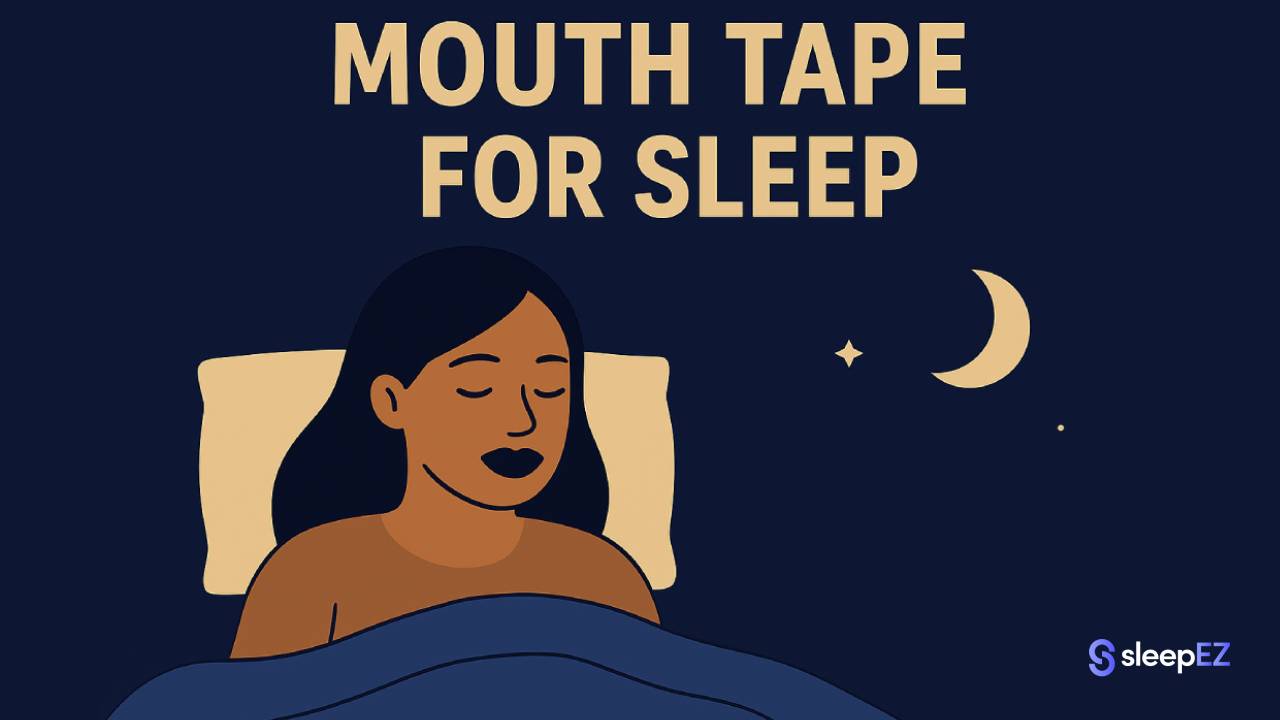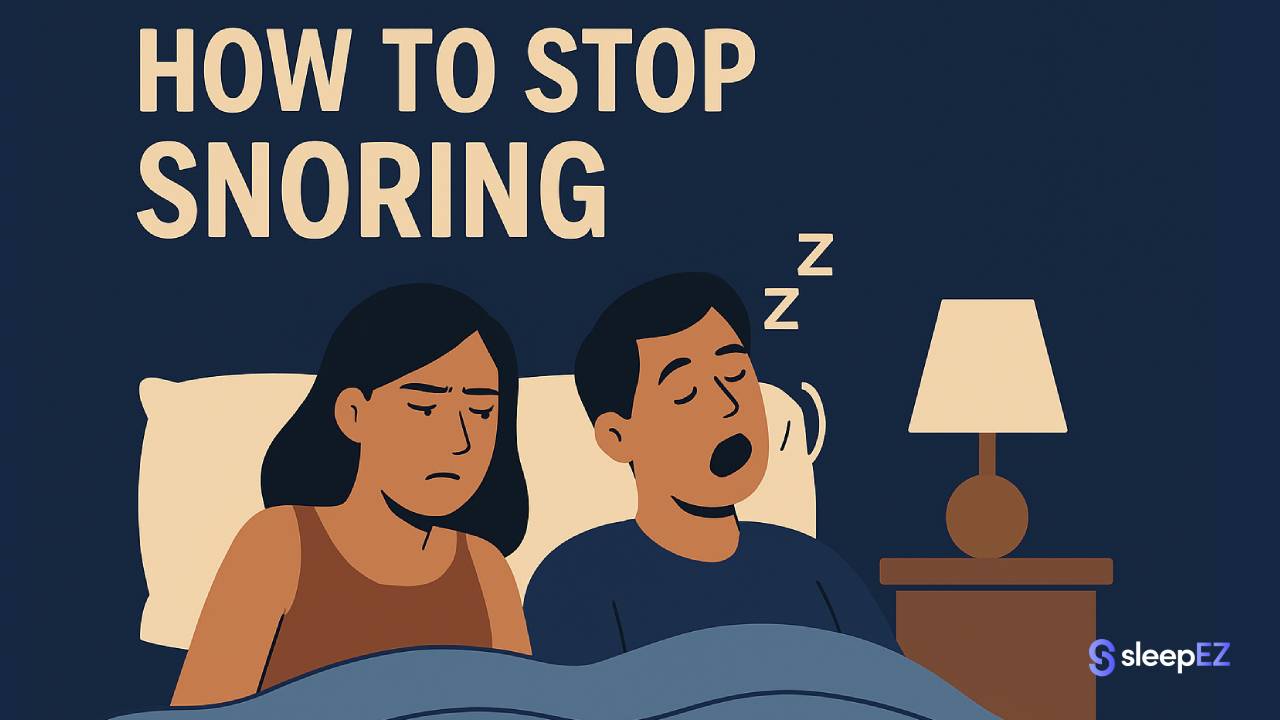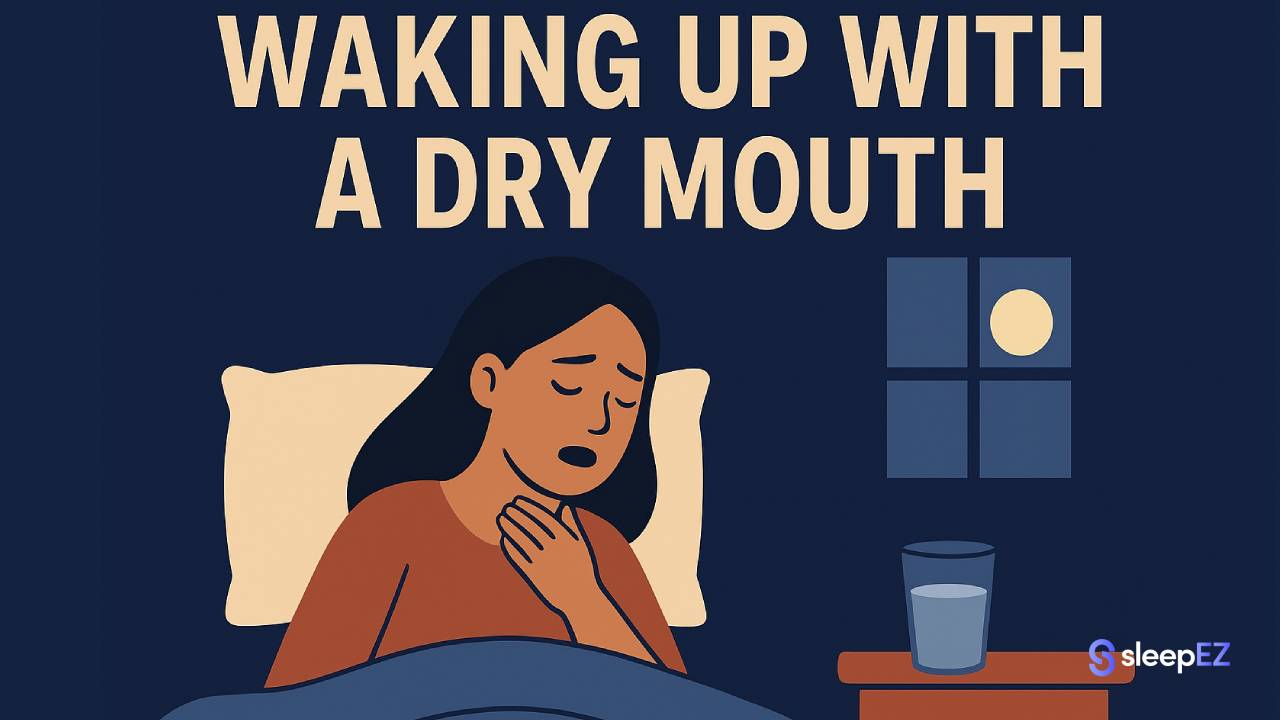Waking up with a dry mouth, a sore throat, or listening to a partner's complaints about your snoring is a frustrating start to the day.
These are often signs of mouth breathing, a habit that can disrupt sleep quality and leave you feeling tired. If you're looking for a simple solution, you may have come across an intriguing tool: mouth tape.
This guide provides a complete overview of using mouth tape for sleep. We'll explore exactly what it's used for, its benefits and risks, and how you can get started safely.
Quick Answer
What it is: Specially designed tape that gently keeps your mouth closed while sleeping
Main benefits: Reduces snoring, prevents dry mouth, improves sleep quality
Is it safe? Yes for most healthy adults, but there are important exceptions (see below)
Who should avoid it: Anyone with sleep apnea, nasal blockage, or respiratory issues
What is Mouth Tape Used For?
At its core, mouth tape is used to keep the mouth closed during sleep. This simple action encourages the body's natural and more efficient way of breathing: through the nose.
The primary goals of using mouth tape are to:
- Reduce or Eliminate Snoring: By preventing the vibrations in the throat caused by mouth breathing.
- Alleviate Dry Mouth and Bad Breath: By allowing saliva to keep the mouth clean and hydrated overnight.
- Improve Overall Sleep Quality: By promoting a more stable and deeper breathing pattern.
How Does Mouth Tape Work?
Mouth tape is a gentle, skin-safe adhesive strip applied over the lips at night. By keeping the lips together, it helps retrain your body to rely on nasal breathing, which offers several distinct advantages over mouth breathing for sleep quality and overall health.
Is Mouth Taping Safe?
Yes, mouth taping is safe when you use tape specifically designed for this purpose. Your body will naturally wake you if you need to breathe through your mouth.
People have been safely using mouth tape for years to improve their sleep quality.
You should NOT use mouth tape if you:
- Suffer from nasal congestion due to a cold, allergies, or a deviated septum.
- Have difficulty breathing through your nose for any reason.
- Have consumed alcohol or sedatives close to bedtime.
- Are feeling nauseous.
- Are a child.
The primary risk is obstructing your airway if you cannot breathe properly through your nose. Always prioritize your ability to breathe easily.
If you have any concerns about whether mouth taping is right for you, consult your doctor first.
What Kind of Tape Should I Use?
Never use regular adhesive tape, duct tape, or masking tape on your skin. These can cause irritation, leave residue, or stick too aggressively.
You need tape specifically designed for use on skin during sleep, with skin-safe adhesive.
Mouth Taping and Sleep Apnea
This is critical: Mouth tape is not a treatment or cure for sleep apnea. Obstructive Sleep Apnea (OSA) is a serious medical condition where breathing repeatedly stops and starts during sleep. It requires a medical diagnosis and a prescribed treatment plan, often involving a CPAP machine.
Using mouth tape without a doctor's guidance when you have undiagnosed sleep apnea can be dangerous, as it may worsen the airway obstruction.
However, for some diagnosed CPAP users who struggle with mouth leaks (where air from the machine escapes through the mouth), a doctor may recommend mouth tape in conjunction with their CPAP therapy to improve its effectiveness.
Always consult your doctor or a sleep specialist before trying mouth tape if you have or suspect you have sleep apnea.
How Mouth Tape Works
Mouth taping is simple. You place a piece of specially designed tape over your lips before bed. The tape gently keeps your mouth closed during sleep, encouraging your body to breathe through your nose.
This isn't about forcing anything. Your nose is already capable of handling all your breathing needs during sleep. The tape just prevents your mouth from falling open out of habit.
Many people who benefit from mouth tape don't realize they've been breathing through their mouth at night.
The Benefits of Mouth Tape for Sleep
Now that you know mouth tape is safe (for most people), let's look at what it actually does for you. These benefits explain why so many people have made mouth taping part of their nightly routine.
- Reduces Snoring: Much of snoring is caused by the vibration of tissues in the throat when breathing through the mouth. Nasal breathing helps reduce this vibration significantly.
- Alleviate Dry Mouth and Bad Breath: Mouth breathing dries out saliva, which is essential for cleaning the mouth and controlling bacteria. Nasal breathing maintains a healthy oral microbiome, reducing morning breath and the risk of cavities.
- Improves Sleep Quality: Nasal breathing is more stable and consistent, allowing your body to maintain deeper, more restorative stages of sleep.
- Increases Nitric Oxide Intake: The nasal passages are a primary producer of nitric oxide, a vasodilator that improves oxygen circulation in the body. According to a study in the American Journal of Respiratory and Critical Care Medicine, this can lead to better blood pressure regulation and immune function.
- Filters and Humidifies Air: Your nose is a natural filter, warming, humidifying, and cleaning the air you breathe before it reaches your lungs.
Why Nasal Breathing Matters During Sleep
Your body is designed to breathe through your nose, especially during sleep. The differences between nasal and mouth breathing are significant:
| Aspect | Nasal Breathing ✅ | Mouth Breathing ❌ |
|---|---|---|
| Air Filtration | Filters dust, allergens, and bacteria before air reaches your lungs | Bypasses your nose's natural filtration system |
| Air Quality | Warms and humidifies air for easier breathing | Air enters cold and dry, irritating airways |
| Oxygen Absorption | Produces nitric oxide, which increases oxygen uptake by approximately 10% | Less efficient oxygen uptake |
| Moisture | Keeps your mouth and throat moist throughout the night | Dries out your mouth and throat |
| Snoring | Reduces snoring and improves sleep quality | Can trigger or worsen snoring |
| Sleep Quality | Promotes deeper, more restorative sleep | Often leads to poor sleep and morning fatigue |
| Morning Feeling | Wake up refreshed with no dry mouth | Wake up with dry mouth, sore throat, bad breath |
| Oral Health | Maintains saliva production, protecting teeth and gums | Increases risk of cavities and gum disease |
How to Choose the Best Mouth Tape
Not all tapes are created equal. Avoid using household tapes like duct tape or masking tape, which can damage your skin. Look for tape specifically designed for this purpose.
- Material: Choose a tape made from a hypoallergenic, breathable material like micropore paper tape.
- Adhesive: The adhesive should be gentle enough for sensitive skin but strong enough to hold through the night.
- Shape: Many products come as specially shaped strips that are easy to apply and may have a small unfiltered section over the lips for added peace of mind.
Many people try generic medical tape or cheap alternatives and quit after one uncomfortable night. The tape irritates their skin, feels awkward, or falls off halfway through.
Mouth Tape Recommendation
When it comes to choosing a mouth tape, we believe in a product that balances safety, comfort, and effectiveness. That's why we confidently recommend our own SleepEZ Breathe Mouth Tape.
What makes it different? Three things our users mention most:
- The lip-shaped design actually fits the natural contour of your mouth. It's not just a strip of tape—it's engineered to move with your face throughout the night. Most people forget they're wearing it within minutes.
- The adhesive balance took us months to get right. It needs to stay secure through different sleeping positions, but remove cleanly in the morning without pulling at your skin. We use a hypoallergenic formula that works for sensitive skin.
- The material quality matters more than you'd think. Cheap tape either feels stiff and uncomfortable, or it's so flimsy it peels off. Breathe uses a soft, breathable fabric that actually makes it comfortable to wear for 7-8 hours straight.
Is it perfect for everyone? No. But if you've tried basic medical tape and found it uncomfortable, or if cheaper options haven't worked, this is the tape people switch to and stick with.
How to Try Mouth Taping Tonight
Ready to give it a try? Follow these steps for a safe and comfortable experience.
- Test it First: Before trying it overnight, wear the tape for 15-20 minutes during the day to ensure you feel comfortable breathing through your nose and don't have a skin reaction.
- Practice Nasal Breathing: Take a few moments to breathe deeply in and out through your nose.
- Wash and Dry Your Face: Remove any lotions, balms, or oils from around your mouth.
- Apply the Tape: You can apply it horizontally over the center of your lips or vertically. The goal is a gentle reminder, not a forceful seal.
- Remove it in the Morning: Remove the tape slowly and gently.
Start Sleeping Better Tonight
Mouth taping can be a simple, effective tool for improving sleep quality by encouraging nasal breathing. It offers compelling benefits for those who struggle with snoring, dry mouth, and the fatigue that comes from poor sleep.
However, safety comes first. It's not a one-size-fits-all solution and should be avoided by individuals with nasal obstructions or sleep apnea.
If you're curious, start slow, use the right materials, and listen to your body. For those with underlying health concerns, a conversation with your doctor is always the best first step.
Frequently Asked Questions (FAQ)
Q: Can mouth tape stop snoring? A: For many people, yes. If your snoring is caused by mouth breathing, mouth tape can significantly reduce or eliminate it by promoting nasal breathing.
Q: Will I be able to breathe if my nose gets stuffy? A: Most dedicated mouth tapes are designed to come off with a bit of pressure from opening your mouth. If your nose becomes congested, your body's natural response will be to open your mouth, which should dislodge the tape. Do not use mouth tape if you are already congested.
Q: Can mouth tape help with dry mouth? A: Absolutely. This is one of the most immediate benefits users report. By preventing mouth breathing, it allows your mouth to retain its natural moisture.




Leave a comment
This site is protected by hCaptcha and the hCaptcha Privacy Policy and Terms of Service apply.